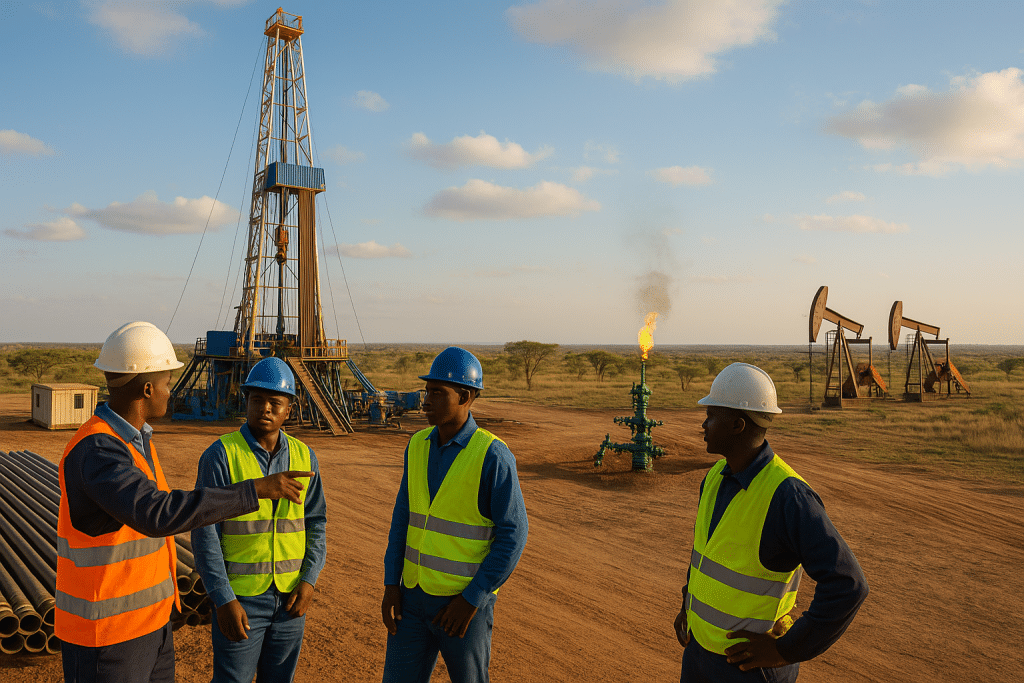Africa’s oil and gas economy plays a pivotal role in fostering financial development across the continent. As the demand for energy resources increases globally, Africa stands out as a key player due to its abundant natural resources. The oil and gas industry not only generates revenue but also attracts investments, creating a ripple effect on economic growth.
The significance of Africa’s oil and gas economy is evident as it drives the financial landscape forward. By harnessing these natural resources strategically, African countries can stimulate job creation, infrastructure development, and technological advancement. This sector’s potential to transform economies makes it a central focus for policy makers looking to ensure sustainable growth.
The role of natural resources in Africa’s economic growth

Africa’s natural resources offer a substantial foundation for its economic growth. The oil and gas economy, in particular, has the power to propel financial development by boosting public and private sectors. Countries endowed with these resources often experience a surge in GDP, elevating their position on the global stage. The careful management and investment in this sector are crucial for ensuring these resources benefit the larger population.
The revenue from oil and gas extraction can be reinvested into different economic areas to maximize impact. Using funds from resource exploitation to improve infrastructure, such as roads and power supplies, enhances overall productivity. Furthermore, establishing a transparent and accountable framework around these resources guarantees that profits contribute to societal advancement.
Impact on energy infrastructure development
Natural resources significantly influence the development of Africa’s energy infrastructure. With substantial investment in the oil and gas economy, countries can modernize their energy systems, leading to improved access and reliability. Innovating within this sector reduces costs and ensures energy security, crucial for both urban and rural communities.
This development is pivotal, as reliable energy access is essential for business operations and industrial growth. By reducing energy bottlenecks, African countries can enhance their industrial productivity and support burgeoning sectors. This infrastructure expansion underscores the importance of strategic planning and investment in the oil and gas economy, reinforcing its role as a foundation for ongoing economic advancement.
Challenges and opportunities in Africa’s oil and gas sector
Despite its promise, Africa’s oil and gas economy faces numerous challenges that necessitate strategic navigation. Issues such as political instability, environmental concerns, and fluctuating oil prices can undermine progress. However, these challenges also present opportunities for innovation and diversification within the sector.
Implementing sustainable practices and embracing technological advancements can help address these challenges effectively. There’s potential for African nations to lead in alternative energy innovations, contributing to a diversified economy. The careful balance of embracing opportunities while managing risks can ensure a thriving oil and gas economy, effectively driving continent-wide financial progress.
Strategies for sustainable resource management
Emphasizing sustainability is key to optimizing Africa’s natural resources for long-term benefits. Effective oil and gas management strategies involve crafting policies that protect the environment while promoting economic growth. Implementing renewable energy solutions alongside traditional resources can contribute significantly to sustainable development.
Additionally, investing in education and skills development within the sector ensures a robust workforce equipped to handle industry demands. By empowering local communities and facilitating technology transfer, African nations can enhance their economic resilience.
Conclusion
The oil and gas economy stands as a beacon of potential for Africa’s financial development. By strategically leveraging and managing these natural resources, the continent can pave the way for substantial economic progress. Prioritizing sustainable practices and infrastructure development will ensure long-term benefits.
Ultimately, the success of Africa’s oil and gas sector depends on strategic policies, sustainable practices, and robust infrastructure. By navigating challenges and exploring opportunities, African nations can drive financial growth and elevate their citizens’ quality of life. This journey towards economic empowerment through resource optimization is essential for Africa’s future development, positioning the continent as a powerhouse in the global arena.



